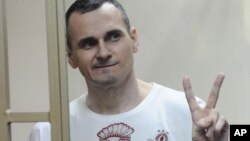A Russian military court in Rostov-on-Don Tuesday sentenced acclaimed Ukrainian film director Oleh Sentsov to 20 years in prison on charges of leading a terrorist group and plotting attacks in Russia-annexed Crimea.
The court ruled Sentsov led members of the “Right Sector,” a right-wing Ukrainian nationalist group, in attacks on pro-Russia organizations in the Black Sea Peninsula, including the offices of Russia’s ruling party - United Russia.
Russian authorities allege Sentsov was armed and, along with three others arrested, plotting to blow up a statue of Russian communist revolutionary Vladimir Lenin.
Rights groups say the case shows every sign of being a politically motivated show trial because of Sentsov’s outspoken opposition to Russia's annexation of Crimea.
Co-defendant Oleksandr Kolchenko was also found guilty of terrorism and sentenced to 10 years. As the verdict was read out, Sentsov and Kolchenko sang Ukraine's national anthem.
The U.S. State Department condemned the sentencing as a "clear miscarriage of justice" that was based on "groundless allegations."
The defendants and rights groups expected a guilty verdict in the highly politicized trial.
"The various violations of fair trial standards point to the fact that these accusations are possibly fabricated for political reasons," said Amnesty International Eurasia program researcher Heather McGill.
Authorities accused Sentsov and Kolchenko of being behind attempts to burn down offices of two Russia-related organizations. Kolchenko admitted to being present when the kitchen at the United Russia office was set on fire, but, along with Sentsov, denied being a terrorist.
“In fact, when you look at the damage that was caused, it’s very hard to imagine how that could be classified as terrorism because it’s minor damage to one door of an organization and it’s damage to the kitchen of another,” McGill said. "So, at the very best it’s an arson attack. But, to describe it as terrorism seems… hard to stomach, really."
Snatched up
Russia's FSB, the successor to the Soviet KGB, arrested the men in May 2014 at a pro-Ukraine rally in Crimea. Russia had annexed the Black Sea peninsula from Ukraine just two months earlier.
Despite being Ukrainian citizens, the men were taken to Russia to stand trial. "The fact that they were transported from the occupied territory of Crimea to Russia to face trial under Russian law is actually a violation of international humanitarian law," said McGill.
The testimony of another arrested man, Gennady Afanasyev, was used as the basis of most of the evidence against Sentsov. Afanasyev pleaded guilty, along with a fourth man, Alexei Chirnigo, with the latter two being sentenced each to seven years in prison. Earlier this month, Afanasyev recanted his testimony alleging he gave it after being tortured.
Sentsov says he was also beaten while in detention, sustaining injuries.
Russian authorities dismissively claimed Sentsov's injuries were caused by his preference for rough sex.
"That particular argument appeared to be baseless and somewhat absurd, especially in a situation when in case of torture allegations by an individual, who is in governmental custody, the government has a duty to investigate and investigate effectively and take those allegations very seriously," said Tanya Lokshina, the Russia program director for Human Rights Watch. “And, that has not been done in the case of Sentsov,” she concluded.
In defiant comments to the court last week, Sentsov said he hoped one day the Russian people would not be afraid to demand justice. He quoted Russian writer Mikhail Bulgakov, saying the “greatest sin on Earth is cowardice."
Russia's Interfax news agency quoted Sentsov's defense team Tuesday as saying they plan to appeal to Russia's Supreme Court; but lawyer Dmitry Dinze told reporters they do not hold high hopes. "We do not think there will be any changes (to the verdict)," he said. "Perhaps, two years maximum will be knocked off (the 20-year sentence)," he added.
Sentsov is best known for his 2011 film “Gamer,” about a teenage computer games champion.
International film directors, including Germany's Wim Wenders, Britain's Ken Loach, and the European Film Academy urged Russian authorities to release Sentsov.
The case marks the latest high-profile trial of foreigners arrested and taken across the border for prosecution in Russia.
Other cases
Russia has also held Ukrainian pilot Nadiya Savchenko since June of last year on charged related to the deaths of two Russian journalists in east Ukraine and for crossing illegally into Russia.
Savchenko, who has since become a symbol of Ukraine's defiance against Russia, denied the charges and said she was abducted inside Ukraine and taken to Russia. Her lawyers said the court is ignoring phone records proving she was already in custody when the journalists were killed. The court is expected to rule on the case as early as September.
Last Wednesday, a court in Russia's northwest Pskov region sentenced an Estonian investigator to 15 years in prison for spying, arms smuggling and illegally crossing the border.
Estonian authorities say Russian security agents abducted Eston Kohver last September on the Estonian side of the border in revenge for an investigation linking them to a smuggling ring.
Kohver's conviction raised already high tensions between Russia and the Baltic states over the Kremlin's actions in Ukraine. Latvia, Lithuania and Estonia, former Soviet republics that are now members of the European Union and NATO, worry a resurgent Russia may attempt further aggression against countries it once controlled.




